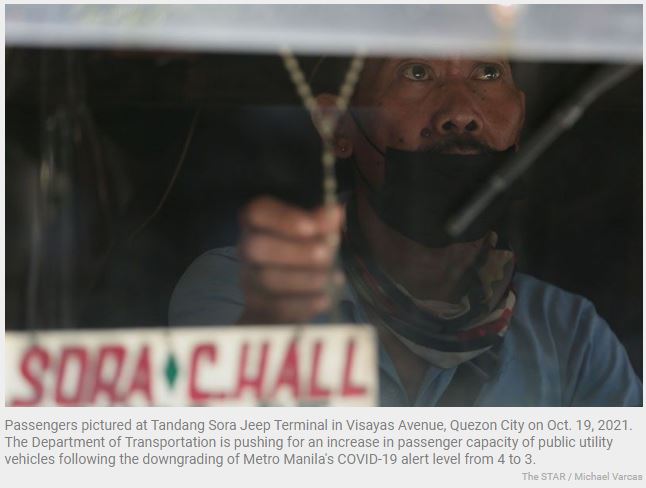Philippines: Ignoring calls to suspend fuel taxes, gov’t to expand cash aid program
MANILA, Philippines — The Duterte administration will not suspend the collection of petroleum taxes despite growing calls to do so amid rallying global oil prices, but would instead expand its cash aid program to include not just the transport and farm sectors but also poor families.
Finance Secretary Carlos Dominguez III admitted that the size of financial assistance won’t be enough to protect the poor from rising prices. He warned that removing or suspending oil taxes could create a massive fiscal headache for the next president, who is bound to inherit a large budget deficit and a heavy debt load.
What Dominguez proposed is a P200 monthly subsidy for 12 million poor families for a year, a program that could cost the government P33.1 billion. This is on top of P5 billion fuel subsidy to public utility vehicle (PUV) drivers, twice the P2.5 billion that the government previously set.
The Duterte administration is also doubling its budget for fuel vouchers for farmers and fisherfolk to P1.1 billion from P500 million previously to cut input cost that may be passed on to consumers.
“This is what we can afford as of this time, and especially for the next admin to be healthy,” Dominguez told President Rodrigo Duterte and fellow Cabinet members during a televised meeting aired on state-run channels Wednesday.
By choosing to expand its cash aid program, the finance chief said there’s more reason not to suspend or scrap fuel taxes as it could sap state revenues. Estimates from the finance department showed suspending excise taxes on petroleum products would lead to a massive revenue loss of P105.9 billion, or about a half-percent of the country’s gross domestic product (GDP) this year.
Dominguez also argued that it is the rich households, not the poor, that would benefit the most from fuel excise tax suspension. Wealthy families are estimated to use up around 48.8% of the Philippines’ total fuel consumption this year, he said.
But Michael Enriquez, chief investment officer at Sun Life Investment Management and Trust Corp., disagreed. “The subsidies are good but it only benefits a certain sector/s plus the distribution of subsidies are always inefficient and subject to a lot of loopholes. Temporarily suspending excise taxes will have a broader impact in the market since not only public utility vehicles will benefit,” Enriquez said in a Viber message.
“There are just some repercussion on the government budget if they suspend excise taxes since this is the one thing which help fund the government deficit. This might result in more government borrowings which can strain the credit outlook for the country,” Enriquez added.
Sonny Africa, executive director at IBON Foundation, a non-profit think tank, believes the government could do better. “It can afford to give P10,000 for at least two months if it wanted to. This will be P360 billion well spent in alleviating recent price increases and huge income losses after two years of lockdowns. Family welfare will improve overnight with more substantial multiplier effects than the same amount spent on capital-intensive and import-dependent infrastructure or from repaying creditors,” Africa said.
Avoiding fare, wage hikes
For Nicholas Antonio Mapa, senior economist at ING Bank in Manila, it appears that the government is using subsidies “to hold back calls to hike transportation price in a bid to limit the impact on inflation.”
Indeed, Transportation Secretary Arthur Tugade told Duterte that his agency’s position is “don’t increase fares, accept the ayuda and use the subsidy.” Next week, regulators will hear the petition of several transport groups to increase the minimum fare for jeepneys in the Metro Manila, Central Luzon, Calabarzon and Mimaropa regions.
To make matters worse for the government, labor groups are asking for a big increase in minimum wage in Metro Manila so the poor can cope with surging prices.
In the same meeting with Duterte, Socioeconomic Planning Secretary Karl Kendrick Chua said that if the minimum wage in Metro Manil increases by 6% while transport fares jump by P1, inflation would quicken to 5.1% and breach the state’s 2-4% target.
“We should be careful. We should know what would bring better results,” Chua said.
This week, oil companies increased the price for diesel by P13.15 a liter, P7.10 a liter for gasoline and P10.50 a liter for kerosene. Energy Secretary Alfonso Cusi told Duterte that prices of diesel could possibly roll back by P13 while gasoline could cheapen by P5 next week if prices in the world market sustain their slump after fresh lockdowns in China dampened outlook on global demand.
But as the oil crisis lingers, ING Bank’s Mapa believes the government should rethink its plan to push employees back to their offices and instead allow work-from-home arrangements for much longer. “This will lower domestic demand for expensive oil and keep the wheels of the economy turning,” Mapa said.
“Instead we have gridlock traffic where we waste away precious, expensive oil when we could have been utilizing technology to improve efficiency. Economic managers need not fret that WFH arrangements will deter spending as most Filipinos have perfected the art of staying productive at home while shopping and dining online. This is the new normal,” he added.
Source: https://www.philstar.com/business/2022/03/16/2167702/ignoring-calls-suspend-fuel-taxes-govt-expand-cash-aid-program


 Thailand
Thailand




